VENUE
CQ is situated in the heart of Melbourne's CBD at 113 Queen Street, between Bourke and Little Collins Streets. On-site parking (off Little Collins St.) and overflow parking within 3 minutes walk.
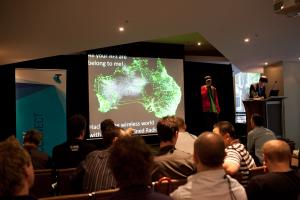
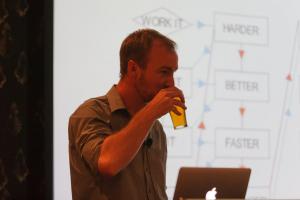
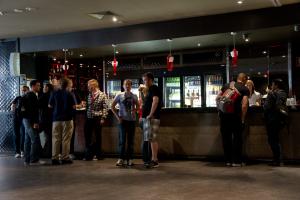
Accommodation
CQ Function Centre is located in the heart of the Melbourne Central Business District (CBD / downtown). Many accommodation options are available for a range of budgets and all of them are a either a short walk or tram ride to the venue. You will find it quite easy to get around the CBD due to the grid layout and trams, which run along most major streets. For a complete list of options in Melbourne, we recommend you visit the accommodation booking website Wotif. Alternatively, we have prepared a list of options close to the CQ Function Centre.
| Hotel | Rating | Distance | Approx Cost |
| CitiClub |
 |
0 Blocks | $129 |
| Intercontinental Rialto |
|
2.5 Blocks | $275 |
| Metro Apartments |
|
0.5 Blocks | $155 |
| Oaks on Market |
|
2 Blocks | $159 |
| Formule1 |
|
2 Blocks | $80 |
| Fairfax House |
|
0.25 Block | $242 |
| Oaks on Collins |
|
2 Blocks | $154 |
| Quest On William |
|
1 Block | $190 |
| The Sebel Melbourne |
|
1 Block | $285 |
| Mantra on Little Bourke |
|
1.5 Block | $230 |
Getting to the Conference
FROM THE AIRPORT
| Taxi | The CQ Function Centre is located 25 km from Melbourne's Tullamarine Airport. It takes approximately 30 minutes travel time, with the taxi fare costing around $50. |
| Skybus | The Skybus Super Shuttle runs between Tullamarine Airport and Southern Cross train station. Tickets are $16 one way, $26 return. Between 6:00am and midnight, the shuttle runs every 10 minutes. |
| Rental Cars | Car hire companies include Avis, Budget, Hertz, National and Thrifty and have their offices in the domestic arrival baggage collection areas. Contact them directly for current rates. Melbourne Airport operates two information desks, located in Arrivals and Departures, which are open at all times during flight operation hours. They can assist with any further questions on airport arrival. The website can also provide advice on transportation options. |
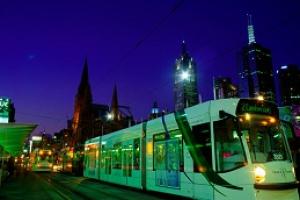
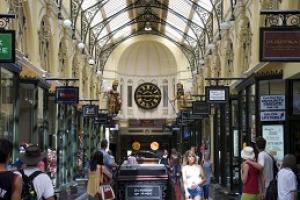
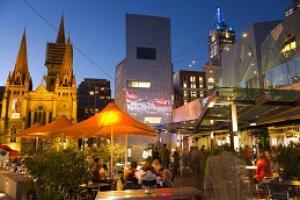
TO THE VENUE
| Car | On-site parking is available at CQ off Little Collins St. for a fee. |
| Trams | Tram numbers 11, 31, 42, 48, 109 or 112 stop at the intersection of Collins Street and Queen Street (Stop #4). Alight from the tram and head up Queen St, past The Sebel Hotel and walk approx. half a block to the conference venue. |
| Trains | The closest train station to the CQ Function Centre is Southern Cross Station. Exit the station onto Spencer Street, and head towards the the Spencer St and Collins Street intersection then turn left up Collins Street. You will find trams along Collins St that will take you to Queen St, or walk 3 blocks to Queen St. To plan your trip using public transport from any starting point in Melbourne use Public Transport Victoria: http://ptv.vic.gov.au/ Metcards and myki can be used on trains, trams and buses and are available from stations, newsagents, 7-11 stores, selected chemists and ticket machines. An adult all day Zone 1 Metcard costs $7.60 and allows unlimited all day travel on trams, trains and buses within Zone 1 (CBD and inner city areas). For more information regarding fares and tickets, click here. |
Melbourne
Millions of people choose to visit Melbourne each year and for very good reasons.
First, it’s one of Australia’s most exciting destinations. A large modern city with a rich heritage, it bustles and pumps with a unique fusion of culture, cuisine and beauty. It’s also Australia’s sporting capital and the heartland of the nation’s fashion industry. Melbourne has it all and that’s why visitors from all over the world flock to enjoy every one of its bits and pieces.
A lazy stroll around town will have you looking up and down and you’ll be enthralled by so many eye-catching elements. If it’s architecture you’re interested in, look up: the buildings form a rare collection of Gothic, Neo classical and Victorian styles. Look higher up and the tips of the breathtaking skyscrapers pierce the blue, blue skies.
At street level, a seemingly endless network of lanes and alleys bursts to life daily with hundreds of cafes, bars and coffee houses. Your food options are only limited by your taste buds. Every international cuisine is plated up with unparalleled excellence and the dining offerings keep the fussiest gastronome more than content. The food from all over the world is a reflection of the cosmopolitan nature of the city – it’s a true and proud expression of multiculturalism in a vibrant metropolis.
Late, late at night, the historic remaining alleys at the top end of town miraculously transform into a thumping nightspot with hundreds of bars and clubs pulsating until dawn.
If you’re after a more sedate pursuit during your time in Melbourne, just walk to the city’s perimeter and get lost in the magnificent gardens that surround the town in the clear springtime sunshine. Stroll north along the Yarra River and take in some of nature’s best or turn around and head south for yet another blast of culture and food at Southbank or Docklands. The options never stop.
Plan to spend some time here. If the famed shopping doesn’t get you in, the theatre district will be sure to have a top-line show playing. But museums might be your thing, or sport, maybe even a trip to the outlying mountains or wine regions of the Yarra Valley or Mornington Peninsula – they’re all close by.
Prepare to be impressed with what Melbourne has to offer. It’s not just any old city with a big convention centre it’s a must-see destination in its own right.
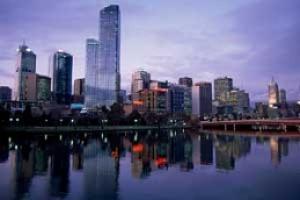
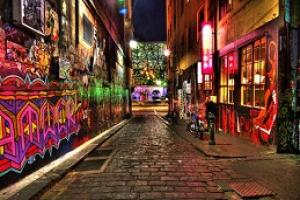
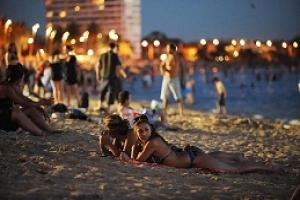
Traveller Information
International Travel
We suggest that you try to allow yourself at least a day in which to adjust to the time difference and relax after your flight before the conference.
Currently 26 international carriers currently operate direct to Melbourne including Qantas, United, Emirates, Etihad,Virgin, Viva Macau, Air China, Cathay Pacific. and Singapore Airlines.
Australian Visa
Visitors seeking to attend or participate in a conference or event in Australia should, in most cases, apply for a short stay business visitor visa (subclass 456). You must apply for your visa early to ensure that details are confirmed prior to your departure for the conference. If you are a speaker and require an invitation letter for visa purposes please contact us at ruxcon@ruxcon.org.au.
Visitors holding an EU passport or from an Electronic AuthorityTravel (ETA) country are able to apply for a visa online. Further information can be found at the Immigration website
Climate
In Melbourne, mid-October is springtime and you can look forward to temperatures of approximately 22 Celsius (72 F) during the daytime, and 10 Celsius (50 F) in the evening.
The weather is famous for being unpredictable. It is said to have ‘four seasons in one day’! Although a day may start off cloudy or rainy, the sun and blue sky will most likely come through later in the day, illuminating the green parks, lush gardens and city buildings with a golden glow.
Currency
Australia uses the decimal system, and the Australia Dollar is the basic unit. Australia’s currency comprises coins of 5, 10, 20 and 50 cent and one and two dollar denominations; and notes of 5, 10, 20, 50 and 100 dollar denominations. The $2 coin is smaller in size than the $1 coin.
Currency exchange facilities are available in most banks, hotels and airports and operate normal business hours.
The most widely used credit cards are MasterCard, Visa, American Express and Diners Club and are accepted at most restaurants and shops. Some stores may have a minimum purchase policy for the use of credit cards or debit cards.
Banks in Australia are generally open 9:30AM – 4:00PM Monday to Thursday, and until 5:00PM on Friday.
Time
Melbourne and the state of Victoria operate under Australian Eastern Standard Time (EST). Eastern Standard Time is ten hours ahead of GMT.
The state of Victoria has a daylight saving period, known as Eastern Daylight Time (EDT), which runs from the end of October through to the end of March.
Business Hours
In Australia, business hours are most commonly 9:00 until 17:30, Monday to Friday, with a small variation either side. Places in the north of Australia sometimes open and close a little earlier. If trying to contact a business in another part of Australia, remember about time differences.
Electrical Appliances
In Australia, the voltage for domestic use is 220-240 volts, AC 50Hz, with 3-pin power outlets. With the use of an adaptor, European appliances will work; however, US 110V appliances will also need a transformer. Univesal adapters may be purchased at the ariport and from newsagents, petrol stations, convenience stores, grocery stores, and tobacconists.
Tipping
Tipping is not as widespread or regulated in Australia as it is in other parts of the world. Tipping is your choice as a reward for good service. It is customary to tip hotel porters (eg. $2.00) and a gratuity of about 10 per cent is usual in restaurants if good service is received. Tips for taxis are regarded as optional, however you may choose to round up to the nearest dollar or two if desired.
Visitors Information Centre
Please see the Destination Melbourne, Capital of Victoria page of this website, or go to:
Visitor Information Centre (Federation Square)
Visitor Information Booth (Bourke Street Mall)
Calling Cards
International calling cards can be purchased from newsagents, petrol stations, convenience stores, grocery stores, and tobacconists, and can provide a very economical method of calling internationally. For outgoing international calls, dial 0011, the country code of the country you are calling, then the number. The country code for Australia is +61. For directory assistance, phone 1123.
Mobile Phones
Mobile phones with 3G and GSM capabilities can be used in Australia. The most common GSM standard used is 900 MHz, but 1800 is also used. 1900 MHz (used in the USA) is not used in Australia. The most common 3G standard used is 2100 MHz. Mobile phones can be used if international roaming has been activated. For more information on Australian mobile phone frequencies please click here.
Pre-paid mobile phone simcards may be purchased from newsagents, petrol stations, convenience stores, grocery stores, and tobacconists. To purchase a pre-paid sim card you will require a form of ID such as a drivers license or passport, and the sim card will cost around $15 - $30.
Phone Apps
If you have an iPhone or Android smart phone, here are some useful apps for you to download to help you during your stay in Melbourne. Most of these apps can be downloaded for free.
FlightTrack - Check gate numbers, delays and cancelations even find alternate flights at more than 5000 airports worldwide with FlightTrack Live Flight Status Tracker. Follow every leg of your flight with real-time updates and zoomable maps.
EAT.DRINK.PLAY.Melbourne - With EAT.DRINK.PLAY.Melbourne, youll know exactly where to find the trendiest bars, the quirkiest boutique hotels, the finest cuisine, no matter your budget, the best live music venues, art spaces, and literary hotspots, the pick of Melbournes markets, the best shopping spots in town.
Lonely Planet, Melbourne Guide - If you are going to be be based in Melbourne for a while and don't fancy hauling around yet another guide book, this app has a map that can be used offline as well as linked into the phones GPS system ('maps') so that you can find where you are. It also has phone numbers for all the bars, restaurants and places it lists.
TramTracker – (Free) - When linked to the phone's GPS you can locate a tram stop by linking to 'maps', browse the different tram routes and by inputting the trams number when you are on board look how long it will take to reach your stop.
Alcohol
The legal age for drinking alcohol in Australia is 18 years. You will be need to provide photo ID at venues where alcohol is served if you appear to be under 25 years of age.
Some restaurants hold a BYO permit, which allows customers to bring their own liquor and drink it on the premises.